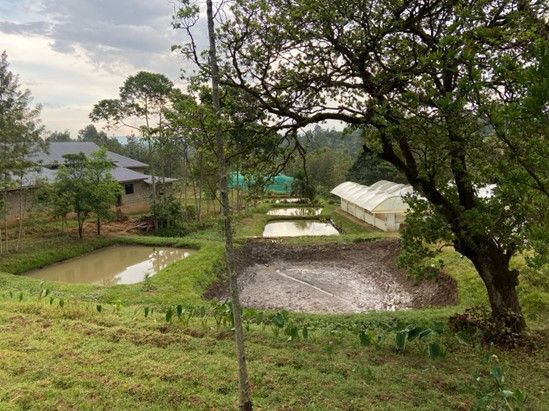About MESPT
- Micro Enterprises Support Programme Trust, Tausi Lane 01, Westlands
- Nairobi P.O Box 187 - 00606 Kenya
- +254 722 207905 / 735 333154
- info@mespt.org

For many years, Mark Mbithi Kiole, business manager, Labedcash Marine Enterprises based in Malava Subcounty, Kakamega County, struggled to expand Labedcash’s aquaculture business. Labedcash Marine, specializes in aquaculture, horticulture, dairy farming, and poultry. However, despite his dedication, the enterprise faced numerous challenges, particularly in accessing a broader market for their fingerlings and mature fish. Their reach was limited to farmers within Kakamega County, with only a few customers from neighboring regions like Uasin Gishu and Kisumu.
Labed Cash’s first interaction with MESPT was in 2021, at the height of the COVID-19 pandemic, when the Green Employment in Agriculture Programme (GEAP) was introduced. At the time, they were farming on a 10-acre piece of land, working with approximately 1,000 farmers. While they had built a small, loyal customer base, the demand for quality fingerlings and mature table-size fish far exceeded their capacity to supply. Market access remained their biggest hurdle, as they primarily relied on local institutions and hotels within Kakamega to sell their fish.
“Before MESPT, the business was struggling to grow beyond Kakamega. We knew there was demand for quality fish and fingerlings, but we didn’t have the networks or resources to reach more farmers,” Mark recalls.
Through MESPT’s intervention, Labedcash Marine Enterprises embarked on a transformation journey. The first step was upgrading the hatchery premises to meet the standards of the Kenya Fisheries Service, the governing body that regulates fingerling production. With support from MESPT, they also procured high-quality broodstock from the Kenya Fisheries Marine Institute, ensuring a steady supply of quality fingerlings.

The enterprise also adopted a structured aggregation model, leveraging digital tools like Kobo to map out farmers within the Kakamega Fish Farmers Cooperative Society. This allowed them to supply quality fingerlings to a growing customer base. Additionally, a cold storage facility was procured, enabling them to aggregate mature fish from farmers and distribute them to a broader market.
One of the most impactful changes was the introduction of a credit system that allowed farmers to access fingerlings and feeds on credit. Under this model, farmers rear fish for eight months, and when the fish are ready for harvest, Labedcash Marine buys them back, deducting the cost of inputs and giving farmers the remaining profits. This system has provided farmers with financial stability and access to quality inputs without the burden of upfront costs.
“Thanks to MESPT, we now work with 4,500 farmers across Siaya, Kisii, Kisumu, Elgeyo Marakwet, Uasin Gishu, and even Mombasa. The credit system has been a game changer. Farmers no longer struggle with capital, and they are assured of a market once their fish mature,” Mark explains.
Beyond improving market access, MESPT also supported research into sustainable fish farming practices. One key innovation has been the integration of Black Soldier Fly (BSF) farming and Azolla cultivation as alternative feed sources. Fish feed costs account for up to 60% of production expenses, making it one of the biggest barriers to profitability. MESPT introduced Labedcash Marine and the farmers to BSF, which has a similar amino acid profile to commercial fish feeds, and Azolla, a water plant that serves as a natural fish feed.

Through training facilitated by Labedcash Marine, farmers have learned how to rear BSF and Azolla on their farms, significantly reducing feed costs. They are provided with starter packs of BSF larvae and Azolla plants, along with training on Good Agricultural Practices (GAP) to ensure sustainability.
“Fish farming used to be expensive, but now we are making our own feeds using BSF and Azolla. It has cut down our costs and those of the farmers, and the quality of fish has improved,” says Mark.
Food safety and quality assurance have also been a major focus. Through the GEAP programme, 620 farmers have been trained and certified in food safety, enabling them to meet Kenya Bureau of Standards (KEBS) requirements for fresh and frozen fish. This certification has opened new markets, ensuring that farmers receive better prices for their produce.
Despite the progress, challenges remain. Climate change has affected aquaculture production, particularly during dry spells when water levels drop. To counter this, Labedcash Marine has invested in a 100-meter borehole to provide a stable water supply for its 45 ponds. In BSF farming, the availability of quality organic waste for larvae feeding has been another challenge. To address this, the enterprise has partnered with farmers who supply organic waste in exchange for BSF larvae, ensuring a constant supply chain.
The impact of MESPT’s support extends beyond the enterprise. By training and empowering farmers with knowledge and resources, Labedcash Marine has transformed aquaculture in Kakamega and beyond. Farmers who once struggled with feed costs and market access are now thriving, contributing to food security and economic growth in their communities.

“We are not just farming fish; we are creating a sustainable system where everything is interconnected. Farmers can now produce their own feeds, access quality inputs on credit, and sell their fish at competitive prices. This is the future of aquaculture,” Mark concludes.
Through MESPT’s intervention, Mark Mbithi Kiole and the farmers he works with have not only scaled their businesses but also built a model of sustainability that is reshaping fish farming in Kenya.